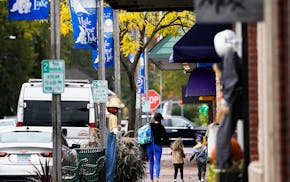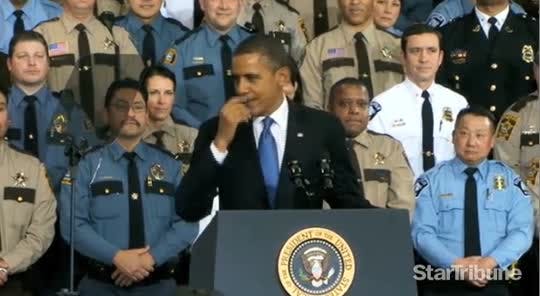President Obama brought his battle against gun violence to Minneapolis on Monday, praising the city for its efforts to reduce youth gunplay to an audience that included survivors of Minnesota gun tragedies.
"You've shown that progress is possible," Obama told an invited, sympathetic crowd at the Minneapolis Police Department's Special Operations Center in north Minneapolis, where he highlighted the city's success in reducing youth gun violence. In his first visit outside Washington, D.C., to promote his own anti-violence and gun-control agenda, Obama said the nation can make similar progress -- if the public demands it.
"The only way we can reduce gun violence in this country is if the American people decide it's important," Obama said. "We're not going to wait until the next Newtown, or the next Aurora," he added, referring to the massacre of schoolchildren in Connecticut and the gunman who shot up a theater full of moviegoers in Colorado.
The president faces an intense political fight over his plan, which includes universal background checks, and a ban on military-style assault weaponry and large-capacity ammunition clips. Obama met privately with more than 20 politicians, law enforcement officials and civilians who know the issue from terrible experience.
In an indication of how tough the fight might be, Hennepin County Sheriff Rich Stanek, who met in a roundtable with the president and other law enforcement officials, said that while gun violence is a concern, "this thing about gun ownership isn't a privilege, it's a right guaranteed by the Constitution." Stanek urged the president to fix the background check system, but he stayed well short of endorsing Obama's complete package.
Meanwhile, Minneapolis Mayor R.T. Rybak expressed outrage at politicians who already were talking down the proposal's chances. "Well, guess what?" Rybak said. "People are dying out there. I am not satisfied with the main sort of front from the people in Washington, that this is sort of a game. Where are the other people on this issue? Get a spine, get a backbone. People are losing their lives."
John Souter, the sole survivor of Minneapolis' Accent Signage shootings last September, said of Obama: "If we don't have the moral courage to support the president of the United States, shame on us." Souter, an Accent employee, was in the private session with Obama.
Marsha Mayes, the mother of 3-year-old Terrell Mayes Jr., who was killed inside his Minneapolis home by a stray round in 2011, was among those attending the speech.
Obama was in town for fewer than three hours, flying out on Air Force One in the company of U.S. Sens. Amy Klobuchar and Al Franken and U.S. Rep. Betty McCollum.
The president's massive security and media following descended on the north Minneapolis neighborhood, where residents stood in the snow to wave and snap pictures as his limousine and motorcade flashed by.
But the tone of the visit was serious. The site of the president's visit, at 41st and Dupont Avs. N., is four blocks south of the home where 5-year-old Nizzel George was fatally shot last summer in a gang dispute.
Roundtable participants said Obama and U.S. Attorney General Eric Holder wanted to hear from law enforcement, mental health advocates, school resource officers and others focused on reducing gun violence.
DFL Gov. Mark Dayton said the president keenly focused on protecting Americans "from these kinds of atrocities."
Dayton also told the president that supporters of tougher gun laws need to understand that people in rural areas often have much different feelings about guns. Rural residents are more accustomed to large hunting rifles, but are also mindful of the need for protection. In cities, police response can be lightning quick. In rural areas, the closest sheriff's deputy can be 30 minutes away, instilling a stronger desire for self-protection. "I represent the entire state," Dayton said. "These measures aren't going to pass in St. Paul without the support of legislators from rural parts of Minnesota."
The Minnesota House will begin three days of hearings on gun violence proposals on Tuesday, at 10 a.m. and at 6 p.m.
Sami Rahamim, son of Accent Signage owner Reuven Rahamim, who also died in the shootings, said he told Obama he supports the measures. "I made sure to thank the president for putting out his proposals to reduce gun violence," he said.
Obama's speech, before risers filled with Twin Cities police officers and sheriff's deputies, focused on a city effort sparked by a spike in juvenile crime a decade ago. Known as the Blueprint for Action, it involved connecting young people with mentors, intervening in kids' lives when necessary and getting students to "unlearn the culture of violence." A progress report showed firearms-related assault injuries among youth had fallen from 159 in 2005 to 94 in 2011.
Obama said the reductions mean "lives saved, parents whose hearts aren't broken" -- and that anti-violence initiatives can make a difference.
As to his own agenda, Obama drew applause when he said, "We don't have to agree on everything to agree it's time to do something." He said he believes a consensus is emerging around the proposal for universal background checks for gun sales.
He acknowledged the difficulty his plan faces. The National Rifle Association opposes these measures, and it has considerable lobbying clout. He said he will need political support to prevail. "Keep the pressure on your members of Congress to do the right thing," he said.
Joseph Olson, Hamline University law professor and longtime campaigner for gun-owners' rights, said Obama's visit is unlikely to change anyone's mind. He said the Minneapolis efforts were successful because they addressed cultural issues that underlie gun violence. "The things they're doing have nothing to do with guns," Olson said.
In the crowd was Leigh Block, whose ex-husband borrowed a gun and killed their 5-year-old daughter, then took his own life in 2004. "She was my only child," Block said, "and if there's anything I can do to prevent this from happening to someone else, that's why I'm here."
Staff writers Matt McKinney and Paul Walsh contributed to this report.

Minnesota added thousands of jobs in March but worker shortage still an issue
Private prison van driver, accused of raping St. Paul woman he was transporting, gets 30 years for similar attacks

Shop the curbs for free on 'Trash to Treasure Day' in White Bear Lake
Longtime Uptown boutique closing in May

